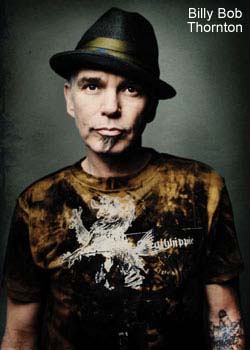Billy Bob Thornton interview
Billy Bob Thornton
Been There

A handful of diehard fans wander around outside the club-parked tour bus like Dawn Of The Dead shopping-mall zombies. They don’t seem to know what to do, only that they’re supposed to be here for some reason, since something they crave might be lurking within. And it is.
Inside the vehicle, holding court on the spacious seats in front, sits actor/director/singer-songwriter Billy Bob Thornton, handing out Shiner Bock beers like candy from his personal cooler. Across from him is noted photographer Jim Marshall, knocking back whiskey with equal aplomb. Scattered around the room remaining are Thornton’s management/assistant team, all unusually attractive young women who listen reverently as their fearless leader pontificates on various subjects. And the conversation drifts quickly into the arcane and esoteric.
Even the seasoned Marshall — who’s shooting the tour supporting Thornton’s fourth foray into folkdom, Beautiful Door (UMe/New Door) — can’t keep up with the chatty star. Thornton’s mother was a professional psychic, and once he’d made a dent in Hollywood with his Oscar-winning writing/directorial debut Sling Blade — starring his longtime pal Dwight Yoakam — he set about documenting his suitably spooky childhood through a screenplay called The Gift, which would star Cate Blanchett when it finally made it to the silver screen. And a hush descends over the bus as Thornton begins spinning the yarn of a dusty, bluish-green tome that sat for ages in his parents’ library when he was younger. As soon as he was tall enough to reach it, he says, he took it down and thumbed through its circa-1940s pages.
The book was a ledger, listing local Arkansas men who had died in World War II, complete with Army/Air Force photographs. “And my eyes kept returning to the same two pictures, every time I would look at it,” recalls Thornton, 52. “And I later found out these guys were bombardiers who’d perished with their planes. But I felt this weird kinship with them, and I wasn’t sure why.” Later, at a war museum, the guards gave him permission to climb aboard a vintage B-17 bomber. Deja-vu eerily, he recalls, “I knew everything about it. I knew the whole cockpit layout, even knew where I sat, and that in a past life, I was a bombardier. Because I knew just how to get down in the nose of that plane, even though I’d never been on one before.”
His cousin, a regressionist by trade, confirmed the man’s suspicions. He definitely had a more than passing connection to the second world war. “But I live in a constant state of feeling ghosts,” Thornton sighs. “I’m one of those people who can go into a Civil War cemetery and get vibes like you wouldn’t imagine.” The talkative Marshall is speechless. The ladies are wide-eyed with wonder, as well. This is, perhaps, a side of Thornton they simply haven’t seen before. But, as Shakespeare once opined, “There are more things in heaven and earth, Horatio, than are dreamt of in your philosophy.”
Thornton heartily agrees with this. He firmly believes his house in Los Angeles is haunted by a distinctly feminine spirit, perhaps an actress who passed away there sometime in the ’30s. The wraith has even chased him up the stairs and into bed, he shivers, where he promptly hid beneath the covers. “I always say that I don’t know exactly what I believe, so I kinda believe in anything,” he adds, open-mindedly. Even the opening tracks on Door deal with the otherworldly: “The first song, ‘It’s Just Me,’ is about a guy who commits suicide over jealousy and ends up living inside the person he’s killed himself over. And the next song, ‘Restin’ Your Soul,’ is told from the other person’s perspective — the one who’s left behind.”
Thornton has other tales to tell. Like the one about a certain auction house selling reputed Sling Blade memorabilia, with one major caveat — it’s not exactly the real deal, because only the man himself knows where the true originals are. Or the story of how — after a miserable experience adapting Cormac McCarthy’s All The Pretty Horses for the big screen — he swore he would never get involved with big-time Hollywood directing again. He has just reversed that decision, he reveals — he’ll be behind the lens, possibly in front of it as well, for an upcoming version of Jess Walter’s noir-ish witness-protection novel, Citizen Vince. And once the dust settles on his latest flick, Mr. Woodcock, he’ll start work on a Southern civil-rights story, Tulia, then jump to a take on Leif Enger’s gritty Peace Like A River next year.
But it’s mainly the spirit world that most fascinates the artist this particular afternoon. His mother, Virginia, used a typical ESP card deck, he says, and saw clients on an almost revolving-door basis when he was a kid. “And I’ll tell ya one thing — it damn sure made it hard to sneak in the door at night when you’d been out drinking,” he chortles. “And our living room was like a doctor’s office — we had magazines on the coffee table and everything, and my mom used to speak at medical conventions on parapsychology, and it was always the real thing. But the problem with that kind of ability, or ‘gift,’ is that you kinda know things and think about things that clutter your head up, and it’s a world that you don’t always wanna know about.” Hence Blanchett’s involvement with a murder case in The Gift.
— Tom Lanham
To find out what Thornton saw in the cards, grab the December issue of Illinois Entertainer, available free throughout Chicagoland.









